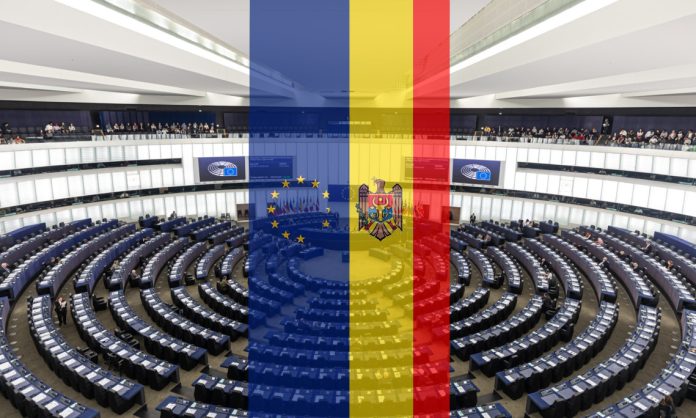In a resolution adopted on Wednesday, September 10, following the State of the European Union address by European Commission President Ursula von der Leyen, and one day after Moldovan President Maia Sandu spoke before the European Parliament, MEPs strongly criticized Russia’s intensification of hybrid operations and attempts at interference ahead of Moldova’s September 28 parliamentary elections, and called on EU member states to swiftly open accession talks with Chisinau.
The text, adopted with 490 votes in favor, 65 against, and 86 abstentions during a plenary session of the European Parliament in Strasbourg, stresses that Moscow’s repeated attempts to interfere in Moldova’s democratic processes clearly aim to destabilize the country and pull it away from the path of democracy, forcing it to revoke its sovereign decisions, especially those related to future EU accession.
MEPs welcomed Moldova’s strong commitment to EU-related reforms and its steady progress despite significant internal and external challenges — including Russia’s full-scale war of aggression against Ukraine and the Kremlin’s specific hybrid threats. They reaffirmed their unwavering support for Moldova’s EU accession prospects and urged the Council to quickly open accession negotiations with Cluster 1 (fundamentals) as recognition of Moldova’s substantial progress on essential reforms.
The deputies underlined that the upcoming parliamentary elections are crucial for Moldova’s democratic consolidation and advancement toward EU membership. They stressed the importance of the EU continuing to support Moldova in ensuring a free, fair, and transparent vote. The Parliament also called on national authorities, civil society, and the EU to improve strategic communication to counter false narratives promoted by Russia. Additionally, MEPs acknowledged the key role of civil society organizations in combating disinformation and malign influence from political actors opposing reforms and from Russian agents.
The resolution highlights that comprehensive justice reform and the fight against corruption are essential — both for Moldova’s resilience against foreign interference and hybrid threats, and for the success of democratic and EU-related reforms. It also acknowledges Moldova’s sustained efforts to build an independent, impartial, accountable, and professional judiciary.
European Commission President Ursula von der Leyen on Wednesday advocated in the European Parliament for accelerating enlargement, stressing that the future of Moldova, Ukraine, and the Western Balkans lies within the European Union. One day earlier, Moldovan President Maia Sandu had delivered a solemn speech from the same podium of European democracy, calling for her country’s EU integration alongside Ukraine. In her annual State of the Union speech, von der Leyen responded with the call: “Let’s accomplish the next reunification of Europe!”
Maia Sandu, recalling the history of EU enlargement, emphasized that most democracies were not fully consolidated when they joined the Union. She stressed that Moldova is not asking for “shortcuts,” but is engaged in a “race against time” to anchor the country in the EU and shield it from Russia.
Her speech before the European Parliament was intended to highlight the decisive character of this month’s elections, counter Russia’s hybrid tactics, and strengthen the irreversibility of Moldova’s European path.


